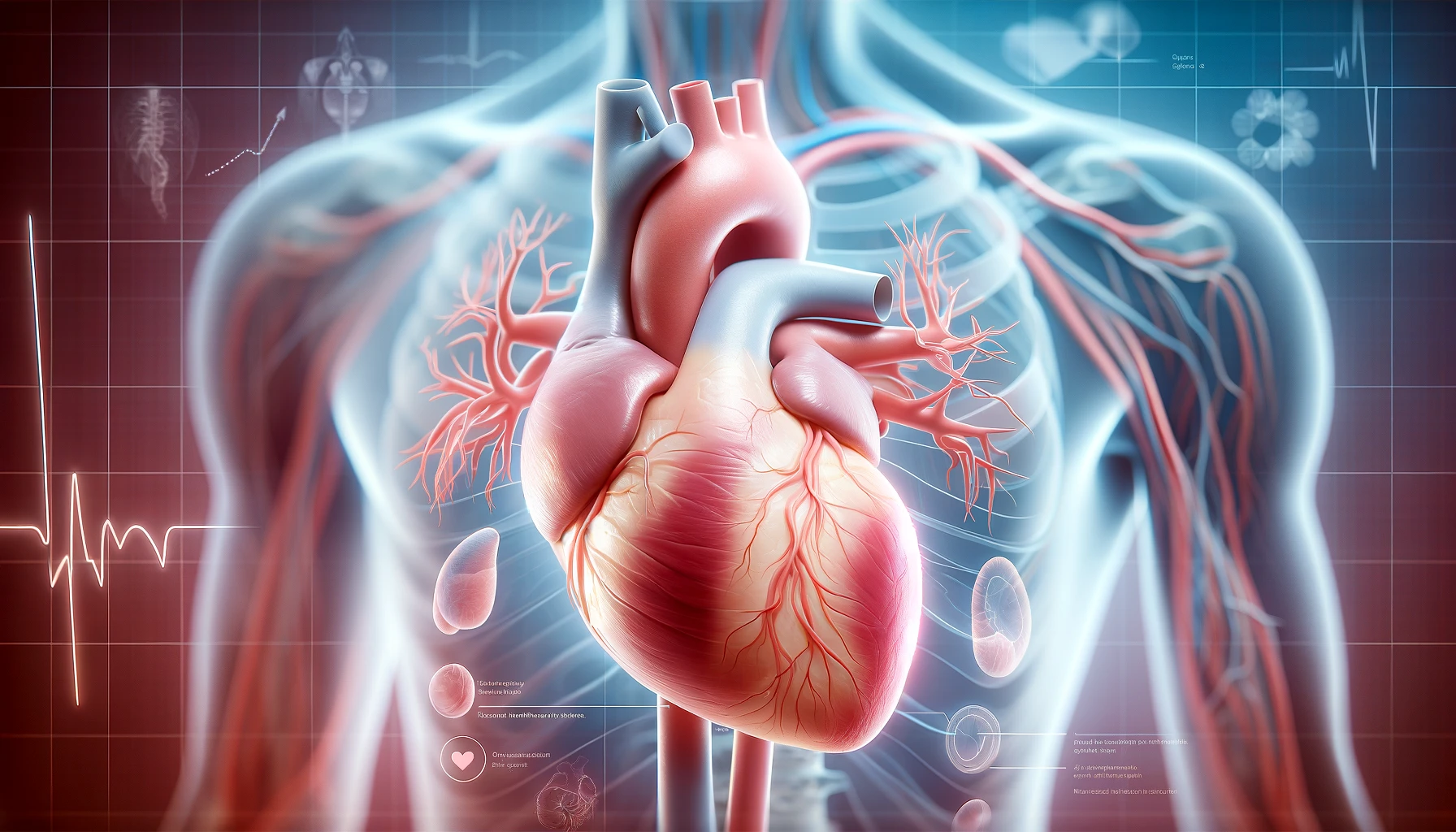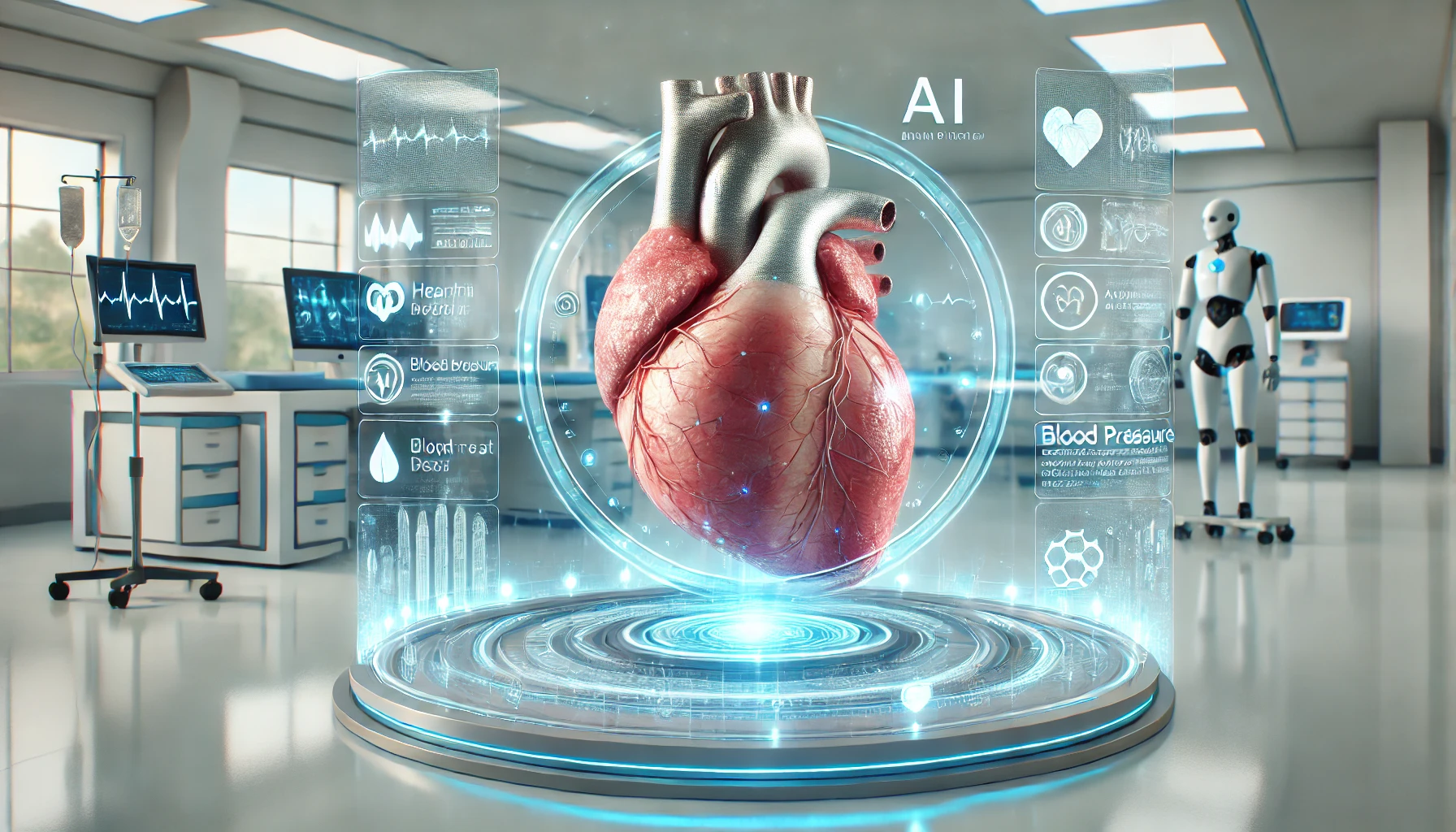Heart health is a cornerstone of overall well-being, influencing everything from energy levels to longevity. With heart disease being one of the leading causes of death globally, the importance of maintaining a healthy heart cannot be overstated. The rising prevalence of heart disease underscores the urgent need for effective prevention strategies. Traditional methods of heart health management, such as diet, exercise, and regular medical check-ups, remain crucial. However, innovative approaches are emerging that offer new avenues for prevention and treatment.
One such groundbreaking development is the use of artificial intelligence (AI) in heart health. AI heart disease detection and AI-driven heart monitoring are revolutionizing the way we approach cardiovascular care. These technologies provide more accurate diagnostics, predictive analytics, and personalized treatment plans, making it easier to manage and improve heart health. Incorporating AI in cardiology not only enhances the precision of medical interventions but also empowers individuals to take proactive steps in maintaining their heart health. Understanding the importance of heart health and the innovative tools available can help you make informed decisions about your lifestyle and medical care. By leveraging both traditional and modern approaches, you can significantly improve your heart health and overall quality of life.
Lifestyle Changes for Heart Health
Nutrition
A balanced diet is fundamental to maintaining heart health. Consuming a variety of nutrient-rich foods can significantly reduce the risk of heart disease. A diet rich in fruits, vegetables, and whole grains provides essential vitamins, minerals, and fiber that support cardiovascular function. These foods are low in calories and high in nutrients, making them ideal for maintaining a healthy weight and reducing the risk of heart disease. Limiting the intake of saturated fats, trans fats, and cholesterol is crucial. These substances can increase the levels of bad cholesterol (LDL) in the blood, leading to plaque buildup in the arteries, which can cause heart attacks and strokes. Opt for healthier fats, such as those found in olive oil, avocados, and nuts, which can help improve cholesterol levels and support heart health. Reducing sodium and sugar intake is another important aspect of a heart-healthy diet. High sodium levels can lead to hypertension, a major risk factor for heart disease. Processed foods, canned soups, and fast foods are often high in sodium, so it’s essential to read labels and choose low-sodium options. Similarly, excessive sugar consumption can lead to obesity and diabetes, both of which are risk factors for heart disease. Opt for natural sweeteners like honey or fruits to satisfy your sweet tooth without compromising your heart health.
Physical Activity
Regular physical activity is one of the most effective ways to improve heart health. Exercise helps to strengthen the heart muscle, improve blood circulation, and reduce the risk of heart disease. Engaging in at least 150 minutes of moderate-intensity aerobic exercise or 75 minutes of vigorous-intensity exercise per week is recommended for optimal heart health. Various types of exercises can benefit heart health. Aerobic exercises, such as walking, jogging, swimming, and cycling, are particularly effective in improving cardiovascular fitness. These activities increase the heart rate and promote better oxygen circulation throughout the body. Strength training exercises, such as lifting weights or using resistance bands, can also be beneficial. They help to build muscle mass, reduce body fat, and improve overall metabolic health. Incorporating physical activity into daily routines can be easier than it seems. Simple changes, such as taking the stairs instead of the elevator, walking or cycling to work, or engaging in active hobbies like gardening or dancing, can make a significant difference. Setting realistic goals and gradually increasing the intensity and duration of exercise can help to establish a sustainable fitness routine.
Avoiding Harmful Habit
Avoiding harmful habits is essential for maintaining heart health. Smoking and excessive alcohol consumption are two major risk factors for heart disease. Smoking damages the lining of the arteries, leading to atherosclerosis, a condition characterized by the buildup of plaque in the arteries. This can result in heart attacks, strokes, and other cardiovascular diseases. Quitting smoking is one of the best things you can do for your heart health. Various strategies, such as nicotine replacement therapy, prescription medications, and support groups, can help you quit smoking successfully. Moderation in alcohol intake is also important. While moderate alcohol consumption may have some heart health benefits, excessive drinking can lead to high blood pressure, heart failure, and other cardiovascular problems. It’s recommended to limit alcohol intake to one drink per day for women and two drinks per day for men. If you have a history of alcohol abuse or other health conditions, it’s best to avoid alcohol altogether. By making these lifestyle changes, you can significantly improve your heart health and reduce the risk of heart disease. A balanced diet, regular physical activity, and avoiding harmful habits are key components of a heart-healthy lifestyle. These changes, combined with regular medical check-ups and the use of innovative technologies like AI in cardiovascular care, can help you maintain optimal heart health and overall well-being.
Monitoring and Regular Check-Ups
Importance of Regular Health Screenings
Regular health screenings are vital for maintaining heart health and preventing cardiovascular diseases. These screenings help in early detection of potential issues, allowing for timely intervention and management. Blood pressure checks are one of the most important screenings for heart health. High blood pressure, or hypertension, is a major risk factor for heart disease and stroke. Regular monitoring can help you keep your blood pressure within a healthy range and take necessary actions if it starts to rise. Cholesterol levels are another critical aspect of heart health.
High levels of LDL cholesterol can lead to plaque buildup in the arteries, increasing the risk of heart attacks and strokes. Regular cholesterol screenings can help you manage your cholesterol levels through diet, exercise, and medication if necessary. It’s important to monitor both LDL (bad) cholesterol and HDL (good) cholesterol, as well as triglycerides, to get a comprehensive picture of your heart health. Blood sugar levels should also be monitored regularly, especially for individuals with diabetes or those at risk of developing diabetes. High blood sugar levels can damage blood vessels and nerves that control the heart, leading to an increased risk of heart disease. Regular screenings can help you manage your blood sugar levels through lifestyle changes and medication, reducing the risk of cardiovascular complications.
Role of Medical Professionals
Medical professionals play a crucial role in maintaining heart health. Primary care physicians are often the first point of contact for individuals seeking medical advice. They can perform initial screenings, provide guidance on lifestyle changes, and refer patients to specialists if needed. Regular visits to your primary care physician can help you stay on top of your heart health and address any concerns promptly. Cardiologists are specialists in heart health and are essential for individuals with existing heart conditions or those at high risk of developing heart disease. They can perform advanced diagnostic tests, such as echocardiograms, stress tests, and AI cardiac diagnostics, to assess heart function and detect any abnormalities.
Cardiologists can also develop personalized treatment plans, including medication, lifestyle changes, and, if necessary, surgical interventions, to manage heart conditions effectively. Nutritionists and dietitians are valuable resources for individuals looking to improve their heart health through diet. They can provide personalized dietary recommendations based on your health status, preferences, and goals.
A nutritionist can help you create a balanced diet plan that includes heart-healthy foods and limits harmful substances like saturated fats, trans fats, and sodium. Regular consultations with a nutritionist can help you stay on track with your dietary goals and make necessary adjustments as needed.
Utilizing Technology for Monitoring
Technology has revolutionized the way we monitor and manage heart health. Wearable fitness devices, such as smartwatches and fitness trackers, can provide real-time data on various health metrics, including heart rate, physical activity, and sleep patterns. These devices can help you stay motivated to maintain an active lifestyle and make informed decisions about your health. Some advanced wearables even offer features like AI-driven heart monitoring and heart disease prediction models, providing valuable insights into your cardiovascular health.
Mobile health apps are another powerful tool for heart health monitoring. These apps can track your daily activities, diet, and health metrics, offering personalized recommendations and reminders to help you stay on track. Many apps also allow you to share your data with healthcare providers, enabling more informed and efficient medical consultations. Some apps utilize AI in cardiovascular care to analyze your data and provide predictive analytics for heart health, helping you identify potential risks and take preventive measures. Remote monitoring systems are particularly beneficial for individuals with chronic heart conditions or those recovering from heart surgery. These systems use smart heart health technology to monitor vital signs, such as heart rate, blood pressure, and oxygen levels, from the comfort of your home. The data is transmitted to healthcare providers, who can monitor your condition in real-time and intervene if necessary.
Remote monitoring can reduce the need for frequent hospital visits, improve patient outcomes, and enhance the overall quality of care. By prioritizing regular health screenings, consulting with medical professionals, and utilizing advanced technology, you can effectively monitor and manage your heart health. These strategies, combined with lifestyle changes and innovative approaches like AI-powered heart treatment, can help you maintain optimal cardiovascular health and reduce the risk of heart disease.
Role of AI in Enhancing Heart Health
Early Detection and Diagnosis
Artificial intelligence is transforming the landscape of heart health by enabling early detection and accurate diagnosis of cardiovascular diseases. AI algorithms for detecting heart disease are designed to analyze vast amounts of medical data, including imaging, lab results, and patient history, to identify patterns and anomalies that may indicate the presence of heart conditions. These algorithms can detect subtle changes that might be missed by human eyes, leading to earlier and more accurate diagnoses.
Predictive analytics for assessing risk factors is another significant advancement. By analyzing data from various sources, including electronic health records and wearable devices, AI can identify individuals at high risk of developing heart disease. This allows for proactive measures to be taken, such as lifestyle modifications and preventive treatments, to reduce the risk of heart disease before it becomes a serious issue. Predictive analytics heart health tools can also help healthcare providers prioritize patients who need immediate attention, improving overall care efficiency. Improved accuracy in diagnostics is one of the most notable benefits of AI in cardiology. AI cardiac diagnostics leverage deep learning cardiology techniques to interpret complex medical images, such as echocardiograms and MRIs, with high precision. These technologies can identify conditions like coronary artery disease, heart valve disorders, and cardiomyopathies more accurately than traditional methods. Enhanced diagnostic accuracy leads to better treatment outcomes and reduces the likelihood of misdiagnosis or delayed diagnosis.
Personalized Treatment Plans
AI is also playing a crucial role in developing personalized treatment plans for heart health. Tailoring treatments based on individual data is essential for effective management of cardiovascular diseases. AI-powered heart treatment systems can analyze a patient’s unique medical history, genetic information, and lifestyle factors to create customized treatment plans. This personalized approach ensures that patients receive the most appropriate and effective interventions for their specific conditions. AI in managing medication and lifestyle changes is another area where technology is making a significant impact. AI-driven heart monitoring systems can track a patient’s adherence to prescribed medications and lifestyle recommendations, providing real-time feedback and reminders.
These systems can also adjust treatment plans based on the patient’s progress and response to therapy, ensuring optimal outcomes. For example, if a patient is not responding well to a particular medication, AI can suggest alternative treatments or dosages based on similar cases. Enhanced patient outcomes through customization are evident in various studies and clinical trials. Personalized treatment plans that incorporate AI in cardiovascular care have been shown to improve patient adherence, reduce hospital readmissions, and enhance overall quality of life. By continuously analyzing heart health data, AI can provide ongoing support and adjustments to treatment plans, ensuring that patients receive the best possible care throughout their journey.
Ongoing Research and Future Prospects
The field of AI in heart health is rapidly evolving, with ongoing research and development paving the way for new and innovative solutions. Emerging AI technologies in cardiology are exploring areas such as AI in cardiac imaging, where advanced algorithms can provide even more detailed and accurate interpretations of medical images. These technologies have the potential to revolutionize the way heart diseases are diagnosed and treated, making healthcare more efficient and effective. The potential for AI to revolutionize heart health is immense. As AI continues to advance, it is expected to play an even more significant role in preventive care, early detection, and personalized treatment. AI-driven heart monitoring systems, for example, are becoming more sophisticated, offering continuous monitoring and real-time analysis of heart health data. This can lead to earlier interventions and better management of chronic conditions, ultimately reducing the burden of heart disease on individuals and healthcare systems.
Examples of successful AI implementations in heart health are already emerging. For instance, AI-powered platforms are being used to analyze electrocardiograms (ECGs) with high accuracy, identifying conditions like atrial fibrillation and other arrhythmias. AI heart disease detection tools are also being integrated into wearable devices, allowing for continuous monitoring and early warning of potential issues. These implementations demonstrate the practical benefits of AI in improving heart health and highlight the potential for further advancements in the field. In conclusion, the role of AI in enhancing heart health is multifaceted and transformative. From early detection and accurate diagnosis to personalized treatment plans and ongoing research, AI is revolutionizing the way we approach cardiovascular care. By leveraging the power of AI, we can improve patient outcomes, reduce the prevalence of heart disease, and enhance overall quality of life. The future of heart health is bright, with AI leading the way towards more effective and efficient healthcare solutions.
Conclusion
Improving heart health is a multifaceted endeavor that requires a combination of lifestyle changes, regular monitoring, and the adoption of innovative technologies. Recapping the key measures to improve heart health, it is evident that a balanced diet, regular physical activity, and avoiding harmful habits form the foundation of cardiovascular well-being.
- Consuming a diet rich in fruits, vegetables, and whole grains while limiting saturated fats, trans fats, and sodium can significantly reduce the risk of heart disease.
- Regular exercise, including both aerobic and strength training activities, helps to strengthen the heart muscle, improve circulation, and maintain a healthy weight.
- Avoiding smoking and moderating alcohol intake are also crucial steps in preventing heart disease and promoting overall health.
- Regular health screenings and consultations with medical professionals are essential for early detection and effective management of heart conditions. Blood pressure checks, cholesterol level assessments, and blood sugar monitoring provide valuable insights into your cardiovascular health, allowing for timely interventions.
Primary care physicians, cardiologists, and nutritionists play a vital role in guiding you through your heart health journey, offering personalized advice and treatment plans based on your unique needs. Embracing both traditional and technological strategies for optimal heart care is key to achieving the best possible outcomes. Wearable fitness devices, mobile health apps, and remote monitoring systems offer convenient and effective ways to track your heart health and stay motivated. These technologies provide real-time data and personalized recommendations, helping you make informed decisions about your lifestyle and medical care.
Additionally, the integration of advanced diagnostic tools and personalized treatment plans ensures that you receive the most accurate and effective care tailored to your specific condition. Encouragement to embrace these strategies is crucial for long-term heart health. By combining traditional methods with innovative technologies, you can take a proactive approach to managing your cardiovascular well-being. Regular exercise, a heart-healthy diet, and avoiding harmful habits form the cornerstone of heart health, while regular check-ups and the use of advanced monitoring tools provide additional layers of protection and support. The synergy between these approaches can lead to significant improvements in heart health, reducing the risk of heart disease and enhancing overall quality of life. In conclusion, improving heart health requires a comprehensive and proactive approach.
By adopting a balanced diet, engaging in regular physical activity, avoiding harmful habits, and utilizing advanced monitoring technologies, you can significantly reduce the risk of heart disease and promote overall well-being. Regular health screenings and consultations with medical professionals ensure that you receive personalized and effective care tailored to your unique needs. Embracing both traditional and technological strategies for optimal heart care is the key to achieving long-term cardiovascular health and a better quality of life.





